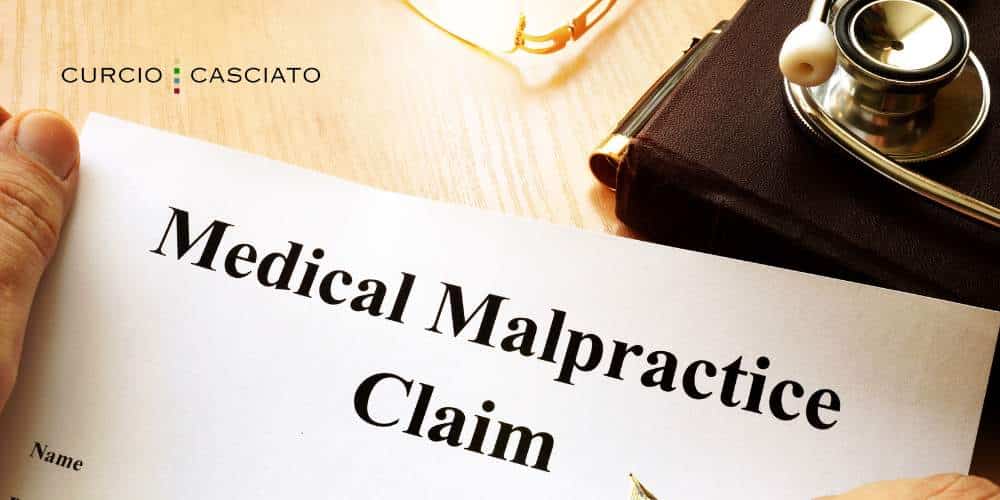Chicago Medical Misdiagnosis Lawyer
Home » Practice Areas » Chicago Medical Malpractice Lawyer » Chicago Medical Misdiagnosis Lawyer
PRACTICE AREAS
The Chicago medical misdiagnosis lawyer team at Curcio & Casciato is experienced in advocating for personal injury victims who have suffered due to a wrong diagnosis or failure to diagnose a serious illness or injury. If you believe medical mistakes have denied you proper treatment or a negligent doctor failed to identify complications, you may have grounds for a medical malpractice claim under Illinois law. As an experienced Chicago medical malpractice attorney team, we are committed to ensuring that medical professionals are held accountable when they do not properly diagnose or fail to provide a correct diagnosis. Our Chicago medical malpractice attorneys offer a free consultation to discuss your medical malpractice lawsuit and determine if you have a viable claim. Our Chicago medical malpractice lawyers handle cases on a contingency fee basis, which means clients will not pay any legal fees unless our law firm secures a favorable malpractice settlement or verdict on your behalf.
Call 312-321-1111 to schedule a free consultation with our Chicago medical malpractice attorneys.

What is Medical Misdiagnosis?
Medical misdiagnosis occurs when a medical professional fails to correctly identify or correctly diagnose a patient’s condition, either by providing a wrong diagnosis for a serious illness or injury or serious disease that the patient does not have, failing to provide a correct diagnosis for a serious injury or illness that is present, or providing an unreasonably delayed diagnosis of a medical issue. Failure to diagnose or failure to provide the correct diagnosis can lead to inappropriate treatment, lack of proper treatment, or delayed life-saving treatment, significantly impacting a patient’s health.
The consequences of medical misdiagnosis and failure to diagnose can be grave, ranging from the progression of an undetected illness to unnecessary medical procedures. In some medical misdiagnosis cases, it can lead to severe complications, worsened prognosis, or even preventable fatalities. For example, a medical professional can fail to diagnose cancer in a patient – whether that be ovarian cancer, testicular cancer, cervical cancer, or a heart attack – and then fail to provide proper medical treatment. The tragic result is the patient dying an early death, which could have been prevented with the help of a competent doctor.
Types of Diagnostic Errors in Medical Malpractice Cases
There are three main types of diagnosis errors: wrong diagnosis, missed diagnosis, and delayed diagnosis.

Incorrect Diagnosis
An incorrect diagnosis, or a wrong diagnosis, is a form of medical misdiagnosis where a doctor fails to correctly diagnose or correctly identify a patient’s medical condition. A wrong diagnosis can occur for various reasons, such as misinterpreting obvious signs, not ordering appropriate tests, not thoroughly reviewing medical records, or the most common, simply not paying attention to what the patient is telling the care provider.
A wrong diagnosis can lead to patients receiving medical treatment they don’t need, potentially causing harm and financial burdens. Additionally, if the true underlying medical condition remains untreated, it can worsen over time, leading to more severe medical conditions.
Missed Diagnosis or Failure to Diagnose
A missed diagnosis occurs when a healthcare provider or doctor fails to identify a patient’s medical condition altogether. Failure to diagnose can occur due to various factors, such as overlooking obvious signs or symptoms, not ordering diagnostic tests, misinterpreting diagnostic test results, or not reviewing medical records.
The consequences of a missed diagnosis can be severe, as patients do not receive medical treatment in a timely manner, allowing the underlying medical condition to progress. A doctor’s failure to diagnose can lead to significant medical conditions or even irreversible harm. Be sure to reach out to a Chicago cancer misdiagnosis attorney to see if you have grounds to file a medical malpractice claim.
Delayed Diagnosis
A delayed diagnosis occurs when a doctor failed to provide a timely diagnosis. In other words, the medical professional does eventually identify complications in a patient’s medical condition, but the correct diagnosis comes later than it should have. This delay can result from various factors, including misinterpretation of symptoms, failure to order appropriate tests, or slow response to medical concerns or abnormal test results.
The consequences of a delayed diagnosis can be substantial, as it often allows the patient’s condition to progress, making it difficult to properly treat the patient and potentially limiting recovery prospects.
Commonly Misdiagnosed Illnesses and Diseases
As per a recent study published in JAMA Network Open in 2022, there are several illnesses and diseases that are frequently subject to misdiagnosis in the United States.

Colorectal Cancer Misdiagnosis
Medical mistakes regarding colorectal cancer can lead to delayed medical treatment and significantly worsen the prognosis. It often results from ignoring symptoms, like unexplained weight loss or blood in the stool, or misinterpreting diagnostic test results.
Lung Cancer Misdiagnosis
Lung cancer is frequently misdiagnosed as a less severe medical condition, such as pneumonia or recurring bronchitis. This can delay critical treatments like surgery or chemotherapy, which are crucial for early stages when the disease is more treatable.
Breast Cancer Misdiagnosis
Misdiagnosis of breast cancer can occur due to improper mammogram readings or ignoring patient-reported symptoms. Delay in the right diagnosis can limit breast cancer treatment options and adversely affect survival rates, making early and accurate detection vital.
Heart Attack, Stroke, or Pulmonary Embolism Misdiagnosis
Misdiagnosing a heart attack, stroke, or pulmonary embolism as a less severe medical condition, such as indigestion, chest pain, or migraine, can lead to catastrophic outcomes. Misdiagnosis claims for heart attacks, strokes, or pulmonary embolisms typically come from the doctor-patient relationship established in an emergency room setting.
Prostate and Testicular Cancer Misdiagnosis
Early symptoms of prostate and testicular cancer are often overlooked or mistaken for other benign conditions, delaying critical interventions that could prevent progression and improve outcomes.
Sepsis Misdiagnosis
Sepsis is a rapid and potentially fatal condition often misdiagnosed due to its common symptoms resembling less severe illnesses. Timely diagnosis is critical, as delayed treatment increases the risk of organ failure and death.
Bladder Cancer Misdiagnosis
Bladder cancer misdiagnosis can occur when symptoms such as frequent urination or blood in urine are attributed to less serious conditions like urinary tract infections. Early detection through correct diagnosis is essential for effective treatment.
Brain Hemorrhage Misdiagnosis
Medical professionals may misdiagnose brain hemorrhages as a migraine or tension headache, delaying life-saving treatment. Recognizing the severity of symptoms and conducting appropriate tests can prevent long-term damage or death.
Cerebral Palsy Misdiagnosis
Cerebral palsy misdiagnosis can delay proper treatment, which is crucial for managing symptoms and improving quality of life. Correct diagnosis is essential for tailoring the right care and support strategies for affected children.
Cervical Cancer Misdiagnosis
Misdiagnosing cervical cancer can occur when symptoms such as abnormal bleeding or pelvic pain are incorrectly attributed to less severe gynecological conditions like fibroids or endometriosis. Regular screening and precise diagnostic tests are key to avoiding misdiagnoses and ensuring timely treatment.
The majority, accounting for 59% of these medical misdiagnoses, are attributed to obvious errors and misinterpretations in diagnostic test results.
Can You Sue a Doctor for Misdiagnosis?
Yes, individuals who have been victims of medical misdiagnosis and who have suffered from a serious injury or condition as a result can pursue legal action through medical malpractice claims.
Medical misdiagnosis is a form of medical negligence, and patients have the right to seek financial recovery for the harm they have endured due to the negligence or errors of healthcare providers. To pursue a successful lawsuit, it is essential to demonstrate that the healthcare provider breached their duty of care, leading to the misdiagnosis and subsequent harm.

Proving Medical Misdiagnosis in Illiinois
Proving medical misdiagnosis occurred involves a multifaceted process that requires demonstrating negligence on the part of healthcare providers. It’s essential to consider the four elements of negligence and understand how the differential diagnosis method plays a crucial role in evaluating misdiagnosis cases. These components collectively form the foundation for legal action in medical misdiagnosis lawsuits, ensuring that patients can seek justice and compensation for the harm they’ve suffered.
When Does Misdiagnosis Qualify for Medical Malpractice in Illinois
To establish medical misdiagnosis as a result of negligence in a legal context, Chicago medical misdiagnosis attorneys can help you prove these four critical elements:
- Duty: It must be proven that the healthcare provider owed a duty of care, called the medical standard of care, to the patient, implying a responsibility to provide competent medical services.
- Breach: It needs to be shown that the healthcare provider breached this duty by failing to meet the accepted standard of care, which typically involves comparing their actions to those of a reasonable and competent doctor.
- Causation: There should be a clear link established between the breach of duty and the misdiagnosis, demonstrating that the negligence directly resulted in the harm suffered by the patient.
- Damages: Finally, it’s essential to prove that the patient suffered significant damages, whether physical, emotional, or financial, as a direct consequence of the misdiagnosis and wrong treatment.
These four elements collectively form the basis for proving medical misdiagnosis cases as a result of negligence and are fundamental in pursuing legal action against healthcare providers. A Chicago medical misdiagnosis lawyer at Curcio & Casciato can help injury victims prove these elements of negligence.

Compensation for Diagnostic Errors in Chicago, IL
Damages for diagnostic errors in medical malpractice cases can encompass various aspects of harm suffered by the patient. These damages may include:
- Medical Expenses: Compensation for past and future medical costs associated with addressing the consequences of the misdiagnosis.
- Lost Income: Reimbursement for income lost due to the misdiagnosis, including time off work for treatment and recovery. To accurately calculate lost wages, it’s crucial to work with a Chicago personal injury attorney.
- Pain and Suffering: Compensation for the physical and emotional distress caused by the misdiagnosis and its repercussions. Our Chicago medical misdiagnosis lawyers can show you how to calculate pain and suffering damages.
- Loss of Consortium: Damages awarded to family members for the loss of companionship and support due to the patient’s suffering.
- Disability and Impairment: Additional compensation for long-term or permanent disabilities resulting from the misdiagnosis.
- Wrongful Death: In misdiagnosis claims where the misdiagnosis leads to a patient’s death, damages may cover the average funeral cost in Illinois and compensation for surviving family members’ loss.
Understanding the comprehensive nature of damages in medical misdiagnosis cases is essential for patients seeking compensation and justice for the harm they have endured. If you have suffered any of the aforementioned damages after a doctor’s failure to diagnose a condition, contact the Chicago medical misdiagnosis lawyers at Curcio & Casciato.
How Much Can I Sue for Misdiagnosis in Illinois?
Based on findings from a 2017 study published in JAMA, the typical settlement amount for medical malpractice lawsuits in the United States averages at approximately $329,565.
How Long Do You Have to Sue for Misdiagnosis in Illinois?
In Illinois, medical malpractice cases are subject to specific statutes of limitations. Generally, patients who have suffered from medical malpractice must file their lawsuits within two years from the date they discovered or reasonably should have discovered the injury or wrongful act. However, there is a maximum limit of four years from the date of the alleged malpractice, regardless of when the injury is discovered. This is an important distinction for patients who receive the wrong diagnosis and wrong treatment because it can take much longer than 2 years to discover that they have been a victim of misdiagnosis.
It’s crucial for potential plaintiffs to be aware of the Illinois medical malpractice statute of limitations, as failure to file within the specified period may result in the forfeiture of their right to pursue a legal claim for medical malpractice. Consulting with an experienced Chicago medical malpractice attorney at the Curcio & Casciato law firm is advisable to ensure compliance with these statutes.
Chicago Medical Misdiagnosis Attorney
If you or a loved one has been a victim of medical misdiagnosis, the experienced Chicago medical misdiagnosis attorneys at Curcio & Casciato are here to offer guidance and support. Our dedicated medical misdiagnosis lawyers are committed to helping you seek justice and rightful compensation for the harm you have endured. Don’t wait to address the consequences of a diagnostic error. Reach out to a Chicago medical misdiagnosis attorney at Curcio & Casciato today by calling 312-321-1111 to schedule a free case evaluation. We understand the complexities of misdiagnosis claims and are ready to advocate for your rights and well-being.


